This article was co-authored by Mohiba Tareen, MD. Mohiba Tareen is a board certified Dermatologist and the founder of Tareen Dermatology located in Roseville, Maplewood and Faribault, Minnesota. Dr. Tareen completed medical school at the University of Michigan in Ann Arbor, where she was inducted into the prestigious Alpha Omega Alpha honor society. While a dermatology resident at Columbia University in New York City, she won the Conrad Stritzler award of the New York Dermatologic Society and was published in The New England Journal of Medicine. Dr. Tareen then completed a procedural fellowship which focused on dermatologic surgery, laser, and cosmetic dermatology.
This article has been viewed 158,212 times.
Every once in awhile, you might want to do a deep facial cleanse. This can be for a variety of reasons, from eliminating blemishes and blackheads to simply wanting fresh, clean skin. There are a variety of different methods you can use to deep clean your face.
Steps
Steaming
-
1Clean your face thoroughly. Before you steam your face, clean it thoroughly.
- Before washing your face, it's a good idea to wash your hands first. Wet your hands and lather them in soap. Then, scrub for 20 seconds, making sure to wash between your fingers, under your nails, and on the back of your hands. To keep track of time, hum the "Happy birthday" song from beginning to end twice. Rinse thoroughly and dry with a clean towel or a disposable paper towel.[1]
- Use a mild soap with limited oils and chemicals and lukewarm water.
- If you wear make-up, make sure to get all your make-up off before you begin the steaming process. Make-up can clog pores, leading to acne. It's a good idea to deep cleanse your face before applying make-up.
-
2Heat a pot of water. Pour water into a pot and heat it over a stove. Only heat the water until it begins to produce steam. You should not heat the water until it boils, as this can burn your face.Advertisement
-
3Add oils. Essential oils should be added to the water to help cleanse and nourish your skin.
- If you're dealing with pimples or acne, bergamot oils has antiviral and antibacterial properties that can reduce breakouts. Geranium oil is also good as it increases skin elasticity and regulates oil production in the skin. Tea tree oil has been known to eliminate acne causing bacteria. If you're prone to frequent breakouts, lemon oil can reduce pores and decrease the likelihood of breakouts.
- If you're looking to improve skin appearance, there are several options. Lavender oil can lighten skin and reduce the appearance of scars and blotches. Carrot seed oil also rejuvenates the appearance of skin by encouraging cell regeneration. Myrrh has certain anti-aging properties that can keep skin looking younger and blemish-free.
- Peppermint or green tea, while not essential oils, can be added to water to increase the steam's moisturizing effect.[2]
-
4Lean your head over the water. Once the water is steaming and oil is added, wrap your head in a towel and lean over the pot of steaming water. Allow the steam to touch your face. However, do not lean too far in as you don't want the water to actually touch your face as it will likely be very hot. If the steam feels too hot and you feel like your face is burning, wait a few minutes and let the water cool some before beginning the steaming process.
- You can also try steaming your face with a small steam machine. This is a safer method that may also be able to provide steam for a longer period of time.
-
5Rinse and moisturize your face. Once 10 minutes has passed, you can wash off your face.
- Remove the towel and pour out the bowl of steaming water.
- Wash your face with cool water. Some dead skin cells, dirt, and debris that have surfaced during the cleanse should wash off.
- Pat your face dry with a clean towel.
- Use a facial moisturizer to lightly moisturize your face after the cleanse. Moisturizer will help keep your skin hydrated and more elastic.[3]
Cleansing with Oil
-
1Make a mixture of castor and extra virgin olive oil. Castor oil and olive oil can deep cleanse the pores, moisturize your skin, and prevent breakouts before they occur.
- Castor and olive oil should be mixed in a 1:4 ratio. This means, for every one part castor oil there are 4 parts olive oil. For example, if you use 1 teaspoon of castor oil use 4 teaspoons of olive oil. If you use 2 teaspoons of castor oil, use 8 teaspoons of olive oil, and so on.
- Mix the oils together thoroughly in a bowl.
-
2Massage the oil into your face. Massage the oils gently into your face. Use gentle, circular motions. It's a good idea to wash your hands first. Make sure your entire face is saturated in oil.
-
3Place a hot washcloth on your face three times. In order for the treatment to work, you need to soak your face with hot water three separate times.
- Soak a washcloth in hot water. As the washcloth is going directly on your face, the water should be hot to the touch but not boiling. You do not want to burn yourself.
- If the water is too hot to wring out of the cloth, then it's too hot to put on your face. Try dabbing your arm with the cloth to test the temperature before putting it on your face.
- Place the wash cloth on your face and leave it in place until it is cool.
- Repeat this process two more times.
-
4Wipe off the oil. Using a clean towel or a disposable paper towel, gently wipe all remaining oil and water from your face. Your skin should be left with a healthy glow and blemishes and scars should be fainter.
Scrubbing Your Face
-
1Buy an exfoliating facial scrub. Exfoliating facial scrubs are sold at most supermarkets, drug stores, and stores that sell beauty products. They usually have small granules designed to force out dead skin cells and debris.
- Prices for exfoliating scrubs range. Some are quite expensive, selling for as much as $30, while others might go for under $10. Browsing reviews online or in beauty magazines can help you make an informed decision about the best scrub for you.[4]
- Exfoliating scrubs have been criticized by environmentalists. Many of the scrubs use non-disposable plastic beads as granules and this leads to pollution in great lakes and other bodies of water. If you're wary about the environmental impact, it might be a good idea to opt to make your own eco-friendly scrub at home.[5]
-
2Make a sugar and honey scrub. A simple brown sugar and raw honey scrub can help exfoliate skin and is simple to make. If you're on a budget or distrustful of the heavy use of plastic in some exfoliating scrubs, this might be a better option.
- In general, mix equal parts raw honey and brown sugar. Mix together well and store in an airtight container at room temperature.[6]
-
3Rub your scrub on in circular motions. Using the scrub you chose, work the concoction into your skin. Use circular motions. Scrub for about two minutes. Be gentle. The beads or grains of sugar should exfoliate your skin without too much extra pressure from you rubbing.
-
4Wash off your face and apply moisturizers. Once you've scrubbed for two minutes, use water to remove the honey and sugar from your skin. Wash until your skin is clean and then pat dry with a clean towel. Wait a few minutes and then rub a light facial moisturizer, one that does not use too many oils, into your face once it's fully dry.
- Be careful not to over-exfoliate your face. Exfoliating too much can cause redness, irritation, and other skin problems.[7]
Using Pore Cleansing Masks
-
1Use milk and gelatin. A popular DIY form of cleansing mask is a simple mixture of either whole fat cow's milk or goat's milk and gelatin. This is a particularly good option if you're looking to remove blackheads. Head to a nearby supermarket and purchase your milk and gelatin, which can typically be found in boxed powder form on the baking aisle.
- Mix equal parts milk and gelatin. Stir until the gelatin dissolves into the milk and then microwave it for 5 seconds. Let it sit for a few minutes to cool and then microwave it for an additional 5 seconds.
- Wait until the mixture is room temperature. Apply to your nose and let sit on for 10 minutes. It should form into a solid mask, which you can peel off when 5 minutes have passed. Blackheads should be reduced by this process.
-
2Try egg white and lime juice. An alternative treatment option for removing blackheads involves a mixture of egg whites and lime juice.
- Use one egg white and one spoon of lime juice. Whisk the mixture together well and apply to the skin, targeting areas you want cleansed.
- Place a paper towel or tissue paper over the concoction and add another layer of egg white and lime juice. Leave the mask until it dries enough to be peeled off.
- Gently peel off all the tissue paper. You should have smoother, fresher skin, reduced blackheads, and smaller pores.
- Avoid using this method if you have especially dry or sensitive skin, as this may cause irritation.
-
3Use whole fat milk and raw honey. Whole fat milk and raw honey both of have antibacterial and antifungal properties that can help deep cleanse skin.
- Mix equal parts milk and honey. Place the mixture in the microwave and heat until it becomes thick and sticky.
- Wait for it to cool to room temperature. Once it has, apply the mixture to your face. Leave on for 25 minutes and then gently peel off the mixture.
-
4Add fresh or dried parsley. Parsley, which can be purchased at a supermarket, is a great addition to any facial cleanser.
- Parsley helps lessen dark spots on skin and also helps clear out clogged pores.[8]
- You can add a sprinkle of dried or fresh parsley to many DIY or store purchased face masks. You can also use fresh parsley on its own by soaking a head of parsley in warm water, wetting a cloth with that water, and applying the water to your face for 10 or 15 minutes.[9]
-
5Buy a clay face mask. Clay masks are among the most popular masks used to deep cleanse skin. Clay has properties that purify the skin and help remove blackheads.
- The price of clay face masks varies depending on whether you're getting your mask from a salon or a supermarket. As with any other skin product, look at reviews online and in beauty magazines so you can make an informed decision.
- Most store bought clay masks will come with instructions for use. Read these instructions thoroughly and follow them when you use the mask.
- Always apply a small bit of the concoction to your arm or leg firs to watch for an adverse allergic reaction.
-
6Finished.
Expert Q&A
Did you know you can get expert answers for this article?
Unlock expert answers by supporting wikiHow
-
QuestionWhat should I do to get rid of acne?
 Mohiba Tareen, MDMohiba Tareen is a board certified Dermatologist and the founder of Tareen Dermatology located in Roseville, Maplewood and Faribault, Minnesota. Dr. Tareen completed medical school at the University of Michigan in Ann Arbor, where she was inducted into the prestigious Alpha Omega Alpha honor society. While a dermatology resident at Columbia University in New York City, she won the Conrad Stritzler award of the New York Dermatologic Society and was published in The New England Journal of Medicine. Dr. Tareen then completed a procedural fellowship which focused on dermatologic surgery, laser, and cosmetic dermatology.
Mohiba Tareen, MDMohiba Tareen is a board certified Dermatologist and the founder of Tareen Dermatology located in Roseville, Maplewood and Faribault, Minnesota. Dr. Tareen completed medical school at the University of Michigan in Ann Arbor, where she was inducted into the prestigious Alpha Omega Alpha honor society. While a dermatology resident at Columbia University in New York City, she won the Conrad Stritzler award of the New York Dermatologic Society and was published in The New England Journal of Medicine. Dr. Tareen then completed a procedural fellowship which focused on dermatologic surgery, laser, and cosmetic dermatology.
FAAD Board Certified Dermatologist
Warnings
- Raw milk contains bacteria like E.coli. Be careful while applying it on your face, or choose a solution that uses pasteurized milk instead.⧼thumbs_response⧽
References
- ↑ http://www.cdc.gov/handwashing/when-how-handwashing.html
- ↑ http://www.huffingtonpost.ca/caroline-topperman/how-to-clean-your-pores_b_7592554.html
- ↑ Mohiba Tareen, MD. FAAD Board Certified Dermatologist. Expert Interview. 26 March 2020.
- ↑ http://www.today.com/style/9-best-rated-face-scrubs-1C8543629
- ↑ http://ecowatch.com/2013/10/28/study-shows-plastic-microbeads-facial-scrubs-pollute-great-lakes/
- ↑ http://thekitchenmccabe.com/2013/11/12/diy-brown-sugar-honey-facial-scrub/
- ↑ Mohiba Tareen, MD. FAAD Board Certified Dermatologist. Expert Interview. 26 March 2020.
- ↑ http://www.huffingtonpost.ca/caroline-topperman/how-to-clean-your-pores_b_7592554.html
- ↑ http://www.huffingtonpost.ca/caroline-topperman/how-to-clean-your-pores_b_7592554.html
- ↑ Mohiba Tareen, MD. FAAD Board Certified Dermatologist. Expert Interview. 26 March 2020.
About This Article
Deep cleansing your face is a great way to reduce blemishes and blackheads and keep your skin looking fresh. One way to deep cleanse your face is with steam. Heat a pot of water over a stove and add a few drops of your favorite essential oil, which will help cleanse your skin. Then, drape a towel over your head and sit leaning over the water for about 10 minutes so the steam can cleanse your pores. You can also cleanse your face with oil. Just mix 1 part castor oil with 4 parts extra virgin olive oil and massage it onto your face. Then, hold a hot washcloth on your face until it cools. Rinse the washcloth in hot water and repeat this process 2 more times. For more tips from our Medical co-author, including how to exfoliate and moisturize your face, read on!


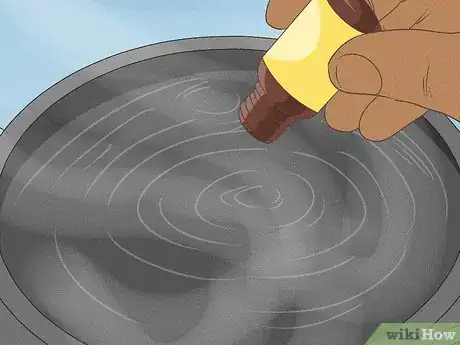










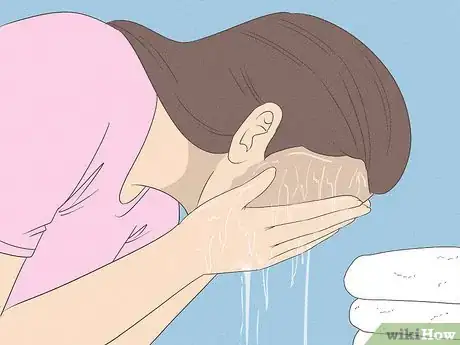
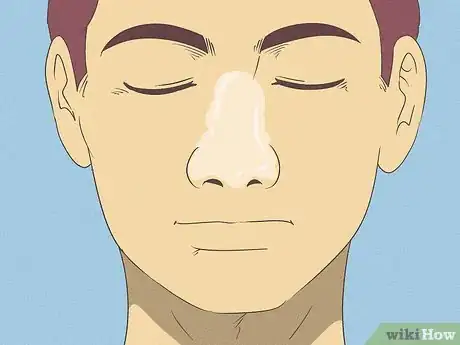


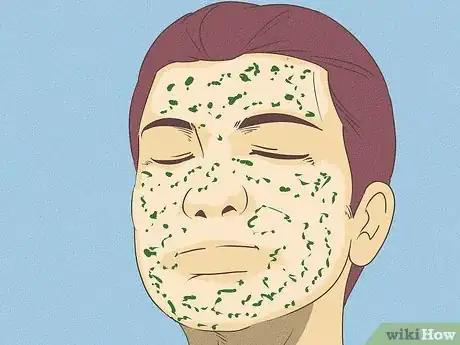



-Step-9.webp)

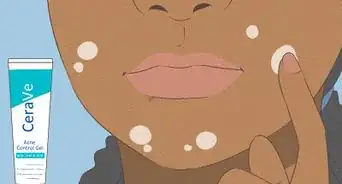



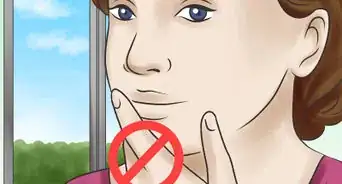

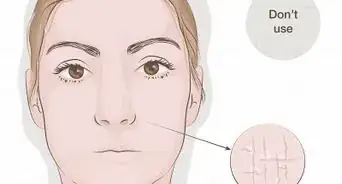








-Step-9.webp)




































